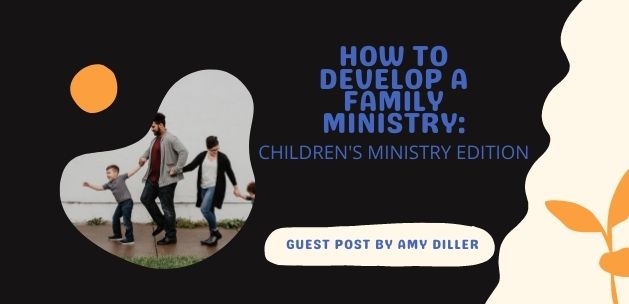This month at M2P, we’re at talking all things Family Ministry. Today, we’ve invited Amy Diller, a leader in the Children’s Ministry world, to share her practical ideas on how to develop a family ministry.
HOW TO DEVELOP A FAMILY MINISTRY: CHILDREN’S MINISTRY EDITION
To those who work in Children’s Ministry, it makes perfect sense to focus on children as we plan and prepare. We decorate spaces for the kids who fill them and write lessons for the kids who hear them. We hold events children won’t want to miss, offer prizes to keep them engaged in Bible reading, and contests to encourage them to memorize scripture. It’s awesome to see kids who can’t wait to get to church and don’t want to leave at the end. Having a front-row seat to hear their amazing insights, thoughtful questions, and heartfelt prayers is such a blessing and encouragement.
What we do for and with children matters, and we play an important role in a child’s growing relationship with Jesus. But that should never be our sole focus. There’s a simple yet vital thing to remember: Kids don’t arrive at church alone.
Every child comes with a family attached, and every one of those families is unique in its structure, spiritual maturity, and needs. As we go about our work week to week, we should continually remind ourselves that family plays the single most influential role in the life of a child. As ministry leaders, making an investment in parents is just as important, perhaps more important, than what we pour into kids. Family Ministry and Children’s Ministry go hand in hand. What we offer parents benefits their kids, and what we offer kids benefits their families.
Every church is different in its understanding and implementation of Family Ministry. There are so many methods and models to consider. No matter how a church approaches ministering to families, there is a crucial place to begin. Think of it like building a house. A builder can’t put siding on walls or shingles on roofs that aren’t there. Every house has to start with the foundation. Without it, the rest of the home cannot exist. Family ministry doesn’t begin with big events, handbooks for parents, or special speakers. It’s built through small, intentional, foundational steps.
The following three ideas will help you develop a ministry that invests in children by investing in families. They may seem basic, but focusing on these things can create a strong community of parents who embrace their roles as the primary spiritual leaders in their homes through the support we offer at church.
1. Relationship
Jesus’ ministry was relational. He spent time with people, called them by name, listened to them, and met spiritual and practical needs. Drop off and pick up times at church can be crazy with kids coming and going, but it’s also an important time to connect face-to-face with parents, grandparents, and siblings.
Start with the basics–make eye contact, greet people by name, ask questions, and actively listen. This may seem like a no-brainer but think about the difference between someone going through the motions of small talk with you compared to someone who takes the time to make these quick conversations personal. It’s where all relationships begin, and it’s how friendships grow.
If you begin and end entirely focused on the kids in your group, you miss out on a connection with the people who matter most to those children.
2. Partnership
Our brains like to sort, categorize, and rank things into groups. It’s how we understand the world around us and the information we take in by simplifying things into their most basic form. We do this with people, ourselves included, and it can have a powerful positive or negative influence on our interactions with one another.
In simplest terms, our role in children’s ministry is one of partnership, not ownership. God’s intention and instruction are clear — parents are charged with the primary discipling of their children. If we categorize ourselves in the role of the only Bible teacher a child has, we’ll communicate our level of importance over the families we serve.
It’s important to remember that we have been invited to play a part in the discipleship of a child, but we are not their primary leaders. When we keep this in mind, we foster connections based on partnerships, which is key in ministering to families.
3. Encouragement
Raising a child is hard–physically, mentally, emotionally, and spiritually. Parenting is a joy-filled journey with a lot of challenges along the way. Moms and Dads need encouragement. Hard work is fulfilling but can be exhausting when accomplished alone. We all benefit by having people around us who acknowledge our efforts, celebrate our wins, and support us when we’re discouraged.
As we develop meaningful relationships with parents, we get to be cheerleaders, teammates, and coaches. Look for opportunities to validate their hard work in parenting by pointing out characteristics you see they’ve instilled in their children. Listen to their concerns and struggles and check-in to see how they’re doing. Pray with them, not just for them. Offer suggestions and resources out of a place of humility, remembering that parents are the experts when it comes to knowing their children.
Taking these foundational steps with families is a worthwhile and necessary investment. It takes time; it takes effort; it takes purposeful and prayerful planning. By giving attention to the families whose children we are privileged to serve, God’s work is multiplied beyond the hours we spend together at church.
When parents understand they have partners in the discipleship of their children, feel connected through relationships at church, and know they are supported in the hard work of parenting, faith is infused more and more into the daily lives of their families.
Amy Diller began her career as an elementary teacher before moving into her current role of Co-Director of Children’s Ministry at Colonial Woods Missionary Church in Port Huron, MI. She is a life-long Michigander, wife to Jason, and mom to two college-aged daughters. Amy loves the smell of a new box of crayons, the feel of a book in her hands, and experiencing God’s Word through the eyes of kids.
FOR MORE ON FAMILY MINISTRY, CHECK OUT:
#045; Talking All Things Family Ministry with Michelle Craddock
#046: Talking All Things Family Ministry with Nick Mobley
Top Blog Posts for Family Ministry
Top Ten Mistakes Family Ministries Make
Connect with your parents in less than five minutes!
Download & send these digital resources to your parents.
A PRAYER GUIDE FOR YOUR FAMILIES & 2 PARENT VIDEOS.


